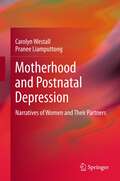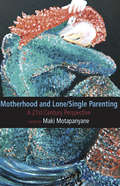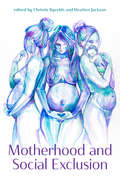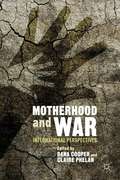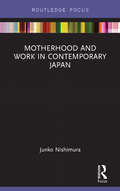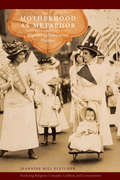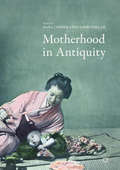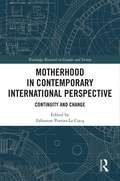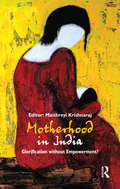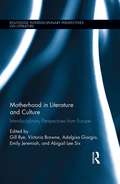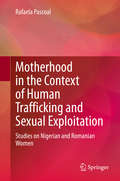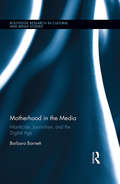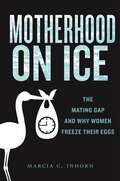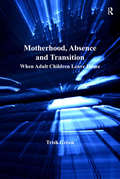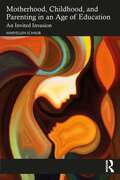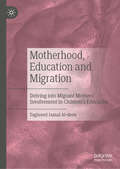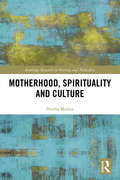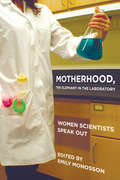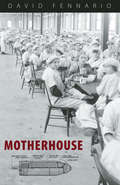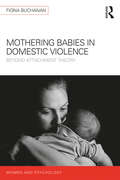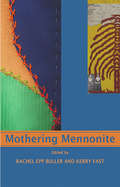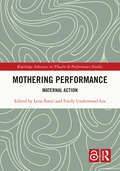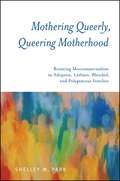- Table View
- List View
Motherhood and Postnatal Depression
by Pranee Liamputtong Carolyn WestallGlobally, postnatal depression (PND) is a growing public health problem. PND affects 10 to 15% of women in Western society. It caused by a combination of biological, psychological and social factors. Two models have attempted to define and explain PND; the biomedical and the sociological models. The traditional biomedical model views PND as a medical condition which implies there is individual pathology and abnormality. Whilst the biomedical model has been the dominant model in treating PND, it has been criticized by feminist sociologists and psychologists for its rigidity in defining and explaining PND. In contrast, the psychosocial model of health acknowledges the biological factors that impact on emotional well-being, but places more emphasis on the personal and social factors that impact on emotional well-being, but places more emphasis on the personal and social factors that contribute to depressive symptoms such as gender, poverty, social disadvantage and social class. The central argument throughout this book is the importance of support before and after the birth for women's emotional well-being. This book will also include women's journeys through pregnancy, childbirth, motherhood, postnatal depression, and resolution. To date, literature has focused on women's lived experiences of PND rather than their personal journeys through pregnancy, childbirth and early motherhood. Additionally, the adjustment to fatherhood has received less attention. For example, little is known about the impact of postnatal depression on the partner, what support partners offer when women with the intention to fill the gap in knowledge of cultural and social issues relating to pregnancy, childbirth, and motherhood for woman who were diagnosed with, and had resolved, PND.
Motherhood and Single-Lone Parenting: A 21st Century Perspective
by Maki MatapanyaneThe 21st century sustains one significant commonality with the decades of the preceding century. The majority of individuals parenting on their own and heading one-parent families continue to be mothers. Even so, current trends in globalization (economic, political, cultural) along with technological advancement, shifts in political, economic and social policy, contemporary demographic shifts, changing trends in the labor sector linked to global economics, and developments in legislative and judicial output, all signify the distinctiveness of the current moment with regard to family patterns and social norms. Seeking to contribute to an existing body of literature focused on single motherhood and lone parenting in the 20th century, this collection explores and illuminates a more recent landscape of 21st century debates, policies and experiences surrounding single motherhood and one-parent headed families.
Motherhood and Social Exclusion
by Christie ByveldsThough the negative effects of social exclusion are well documented, there is a paucity of research on women’s experiences of social exclusion as they relate to mothering within the institution of motherhood. Social exclusion is a socially constructed concept; it refers to a multi-dimensional form of systematic discrimination driven by unequal power relationships. It is the denial of equal opportunities, resources, rights, goods, and services for some, by others, within economic, social, cultural, and political arenas. Carrying, birthing, and mothering children place women in a unique position to face social exclusion based on their role as mothers. Perhaps at no other time in our lives could we benefit more from feeling as though we are engaged in our community than when we enter into and are experiencing the patriarchal institution of motherhood. As the widely used proverb states, “It takes a village to raise a child”, it also takes a village (of societal institutions) to support mothers. Saint Mary's University
Motherhood and War
by Dana Cooper Claire PhelanTraditional histories of war have typically explored masculine narratives of military and political action, leaving private, domestic life relatively unstudied. This volume expands our understanding by looking at the relationships between mothers and children, and the varied roles both have assumed during periods of armed conflict.
Motherhood and Work in Contemporary Japan (Routledge Research on Gender in Asia Series)
by Nishimura JunkoThis book explores the employment of Japanese women born in the 1960s and 1970s who experienced childbirth and raised children in the 1990s and the early 2000s. During this period, the Japanese economy experienced a severe recession. It has affected the firm-specific internal labour market and on employment practices, which in turn are thought to have greatly influenced Japanese women’s employment. On the other hand, the fertility rate declined and social policies to support women’s employment began to be implemented after the 1990s. <P><P>This book explores how these labour market structure and social policies interact to affect Japanese women’s employment. The book first analyses the employment patterns of women born between the 1920s and 1970s and examines how they have varied among different birth cohorts. Then, the employment behaviour of women before and after childbirth through the post-child-rearing period, as well as the working career of single mothers are explored for women born in the 1960s and 1970s. Based on the data analyses, the concluding part of this book discusses how the labour market structure and social policies during the 1990s and early 2000s interactively influenced employment behaviour of Japanese women, and some suggestions are put forward for changing women’s employment during the child-rearing years.
Motherhood as Metaphor: Engendering Interreligious Dialogue (Bordering Religions: Concepts, Conflicts, and Conversations)
by Jeannine Hill FletcherWho is my neighbor? As our world has increasingly become a single place, this question posed in the gospel story is heard as an interreligious inquiry. Yet studies of encounter across religious lines have largely been framed as the meeting of male leaders. What difference does it make when women’s voices and experiences are the primary data for thinking about interfaith engagement?Motherhood as Metaphor draws on three historical encounters between women of different faiths: first, the archives of the Maryknoll Sisters working in China before World War II; second, the experiences of women in the feminist movement around the globe; and third, a contemporary interfaith dialogue group in Philadelphia. These sites provide fresh ways of thinking about our being human in the relational, dynamic messiness of our sacred, human lives.Each part features a chapter detailing the historical, archival, and ethnographic evidence of women’s experience in interfaith contact through letters, diaries, speeches, and interviews of women in interfaith settings. A subsequent chapter considers the theological import of these experiences, placing them in conversation with modern theological anthropology, feminist theory, and theology. Women’s experience of motherhood provides a guiding thread through the theological reflections recorded here. This investigation thus offers not only a comparative theology based on believers’ experience rather than on texts alone but also new ways of conceptualizing our being human. The result is an interreligious theology, rooted in the Christian story but also learning across religious lines.
Motherhood in Antiquity
by Dana Cooper Claire PhelanThis edited collection examines concepts and realities of motherhood in the ancient world. The collection uses essays on the Roman Empire, Mesoamerica, the Philippines, Egypt, and India to emphasize the concept of motherhood as a worldwide phenomenon and experience. While covering a wide geographical range, the editors arranged the collection thematically to explore themes including the relationship between the mother, particularly ruling mothers, and children and the mother in real life and legend. Some essays explore related issues, such as adaptation and child custody after divorce in ancient Egypt and the mother in religious culture of late antiquity and the ancient Buddhist Indian world. The contributors utilize a variety of methodologies and approaches including textual analysis and archaeological analysis in addition to traditional historical methodology.
Motherhood in Contemporary International Perspective: Continuity and Change (Routledge Research in Gender and Society)
by Fabienne Portier-Le CocqDivided into 15 chapters, this book provides the reader with an insight into certain representations of mothers and motherhood in history and today’s societies in some areas of the world, notably in Britain and Asia. Key facts about the history of motherhood are presented, together with the use of very recent notions and phrases portraying ‘good’ and ‘bad’ mothers. An analysis of the concepts of naming and blaming, along with regret with respect to mothers in 21st century societies, provides food for thought. Other issues addressed are varied and numerous: the politics of early intervention, feminist critique, mothers with disabilities and mothers of disabled children, incarcerated mothers, surrogate mothers, teenage mothers, lesbian mothers, and mothering in Eastern Asia, namely in China, Japan, and Korea. Interestingly, both visual arts and literature play a crucial role in this analysis. The publication will appeal to students, academics, researchers, and the general public interested in and seeking to comprehend the shifts that have occurred over time in connection with the vast and inexhaustible subject of motherhood and mothers – a private and public matter. Readers are also provided with a rich reference section dealing with the latest publications on the issues tackled by prominent academics and researchers in human geography, women’s studies, sociology, gender studies, contemporary history, and the arts.
Motherhood in India: Glorification without Empowerment?
by Maithreyi KrishnarajThis book presents an overview of the varied experiences and representations of motherhood in India from ancient to modern times. The thrust of the arguments made by the various contributors is that the centrality of motherhood as an ideology in a woman’s life is manufactured. This is demonstrated by analysing various institutional structures of society – language, religion, media, law and technology. The articles in this book are chronologically arranged, tracing the different stages that motherhood as a concept has traversed in India – from goddess worship to nationalism, to being a vehicle of reproduction of the sexual division of labour and the inheritance of property via the male-line. Underlying these stages are the dialectics between them that have been facilitated by agents such as the state – the ultimate controller of a woman’s reproductive powers. The feminist critique of ‘essentialising’ the role of a woman has been employed to deconstruct and humanise the experiences and lives of mothers. This anthology therefore attempts to initiate a meaningful and ‘sensitive’ engagement with issues pertaining to a woman’s autonomy over her body and her role also as a mother.
Motherhood in Literature and Culture: Interdisciplinary Perspectives from Europe (Routledge Interdisciplinary Perspectives on Literature)
by Victoria Browne Abigail Lee Six Gill Rye Adalgisa Giorgio Emily JeremiahMotherhood remains a complex and contested issue in feminist research as well as public discussion. This interdisciplinary volume explores cultural representations of motherhood in various contemporary European contexts, including France, Italy, Germany, Portugal, Spain, and the UK, and it considers how such representations affect the ways in which different individuals and groups negotiate motherhood as both institution and lived experience. It has a particular focus on literature, but it also includes essays that examine representations of motherhood in philosophy, art, social policy, and film. The book’s driving contention is that, through intersecting with other fields and disciplines, literature and the study of literature have an important role to play in nuancing dialogues around motherhood, by offering challenging insights and imaginative responses to complex problems and experiences. This is demonstrated throughout the volume, which covers a range of topics including: discursive and visual depictions of pregnancy and birth; the impact of new reproductive technologies on changing family configurations; the relationship between mothering and citizenship; the shaping of policy imperatives regarding mothering and disability; and the difficult realities of miscarriage, child death, violence, and infanticide. The collection expands and complicates hegemonic notions of motherhood, as the authors map and analyse shifting conceptions of maternal subjectivity and embodiment, explore some of the constraining and/or enabling contexts in which mothering takes place, and ask searching questions about what it means to be a ‘mother’ in Europe today. It will be of interest not only to those working in gender, women’s and feminist studies, but also to scholars in literary and cultural studies, and those researching in sociology, criminology, politics, psychology, medical ethics, midwifery, and related fields.
Motherhood in the Context of Human Trafficking and Sexual Exploitation: Studies on Nigerian and Romanian Women
by Rafaela PascoalThis book discusses motherhood of Nigerian and Romanian women in Italy and Romania, who are human trafficking victims for sexual purposes. It provides a broad gender approach to emerge on the phenomenon of human trafficking with an analytic perspective of all the social, cultural, legal and economic components that play an important role during all phases of motherhood. The book compares the motherhood of these two nationalities within a context of an illegal/legal status in the European territory. It reflects on the used terms of vulnerability, sexual exploitation, victim, resistance and resilience. This book enlightens scholars and students with a broad perspective on this complex phenomenon, understanding the intersectionality of the victims’ features and its relation with the several push and pull factors that lead a human trafficking victim into vulnerability, resistance and resilience.
Motherhood in the Media: Infanticide, Journalism, and the Digital Age (Routledge Research in Cultural and Media Studies)
by Barbara BarnettThis book examines contemporary media stories about women who kill their children. By analyzing media texts, motherhood blogs, and journalistic interviews, the book seeks to understand better maternal violence and the factors that lead women to harm their children. The central thesis of this book is that media practices have changed dramatically during the past 50 years, as has society’s views on "appropriate" feminine behavior, yet definitions of characteristics of good mothers remain largely defined by 1950s sit coms, Victorian ideals, and Christian theology. The book contends that in spite of media saturation in American society, and the media’s increased opportunities to tell complex and nuanced stories, news media narratives continue to situate maternal violence as rare, unfathomable, and unpredictable. The news media’s shift in focus—from public service to profit-making industry—has encouraged superficial coverage of maternal violence as reporters look for stories that sell, not stories that explain. Motherhood blogs, in contrast, offer an opportunity for women to tell their own stories about motherhood, based on experience. Interviews with journalists offer insights into how the structure of their jobs dictates media coverage of this intimate form of violence.
Motherhood on Ice: The Mating Gap and Why Women Freeze Their Eggs (Anthropologies of American Medicine: Culture, Power, and Practice #10)
by Marcia C. InhornAnswers the question: Why are women freezing their eggs?Why are women freezing their eggs in record numbers? Motherhood on Ice explores this question by drawing on the stories of more than 150 women who pursued fertility preservation technology. Moving between narratives of pain and empowerment, these nuanced personal stories reveal the complexity of women’s lives as they struggle to preserve and extend their fertility. Contrary to popular belief, egg freezing is rarely about women postponing fertility for the sake of their careers. Rather, the most-educated women are increasingly forced to delay childbearing because they face a mating gap—a lack of eligible, educated, equal partners ready for marriage and parenthood. For these women, egg freezing is a reproductive backstop, a technological attempt to bridge the gap while waiting for the right partner. But it is not an easy choice for most. Their stories reveal the extent to which it is logistically complicated, physically taxing, financially demanding, emotionally draining, and uncertain in its effects. In this powerful book, women share their reflections on their clinical encounters, as well as the immense hopes and investments they place in this high-tech fertility preservation strategy. Race, religion, and the role of men in the lives of single women pursuing this technology are also explored. A distinctly human portrait of an understudied and rapidly growing population, Motherhood on Ice examines what is at stake for women who take comfort in their frozen eggs while embarking on their quests for partnership, pregnancy, and parenting.
Motherhood, Absence and Transition: When Adult Children Leave Home
by Trish GreenThe vast majority of academic texts on motherhood have focused on women’s experiences of the early years of mothering, while texts covering the topic of home-leaving have tended to privilege the young person's experience. Combining lively empirical material with an illuminating social-theoretical framework, Trish Green's book addresses the much neglected area of the mother's experience of separation from her child at the time of their home-leaving. The book makes clear how the mother's experience of separation is silenced, first by the socio-cultural constructions of motherhood per se, second by the privileging of the child's transition to adulthood, and third by a neglect of the relational dimension of this particular life-course transition. In doing so the book makes an important contribution to debates on ageing, identity and the life-course, and will be of great interest to sociologists with various academic interests.
Motherhood, Childhood, and Parenting in an Age of Education: An Invited Invasion
by Maryellen SchaubMotherhood, as a celebrated yet underappreciated role, is often thought of as a natural process, something instinctive that we refine by watching our own mothers and others in our community. We rarely think of motherhood as something that is time and culturally specific, yet, like culture itself, it is socially constructed, and both motherhood and childhood evolve over time. With the rise in educational attainment of mothers in the American population, the expectations associated with childhood increasingly include not just education but cognitive development and extracurricular activities as the partnership between parents and education intensifies in the joint project of human development of children. Motherhood, Childhood, and Parenting in an Age of Education offers a new way to conceptualize the high demands of contemporary parenthood. It traces the emerging narrative about the "good mother," changes in the underlying assumptions of what constitutes the "good mother," and the implications for the "good childhood" as education grows in institutional strength. This book demonstrates that education is driving the formation of the parent and child roles in the dominant contemporary culture of the US although alternate models exist. Education itself has expanded over time to become our largest social intervention, defining behaviors and beliefs such as parental involvement in schooling, the unengaged parent, and the deficient student.
Motherhood, Childhood, and Parenting in an Age of Education: An Invited Invasion
by Maryellen SchaubMotherhood, as a celebrated yet underappreciated role, is often thought of as a natural process, something instinctive that we refine by watching our own mothers and others in our community. We rarely think of motherhood as something that is time and culturally specific, yet, like culture itself, it is socially constructed, and both motherhood and childhood evolve over time. With the rise in educational attainment of mothers in the American population, the expectations associated with childhood increasingly include not just education but cognitive development and extracurricular activities as the partnership between parents and education intensifies in the joint project of human development of children. Motherhood, Childhood, and Parenting in an Age of Education offers a new way to conceptualize the high demands of contemporary parenthood. It traces the emerging narrative about the "good mother," changes in the underlying assumptions of what constitutes the "good mother," and the implications for the "good childhood" as education grows in institutional strength. This book demonstrates that education is driving the formation of the parent and child roles in the dominant contemporary culture of the US although alternate models exist. Education itself has expanded over time to become our largest social intervention, defining behaviors and beliefs such as parental involvement in schooling, the unengaged parent, and the deficient student.
Motherhood, Education and Migration: Delving into Migrant Mothers’ Involvement in Children’s Education
by Taghreed Jamal Al-deenThis book draws together analysis of class, gender, ethnicity and processes of migration in the context of family-school relationships. It provides an original analysis of the role of class as gendered and ethnicised in the explanation of the reproduction of educational inequalities. This book’s analysis of class is developed through insights into how class, gender, ethnicity and religion are interrelated and connected to patterns of advantages and disadvantages in transnational flows. It explores parental involvement in children’s education in the migratory context as a key site for the analysis of social class positioning and repositioning, focusing on a group of migrant Muslim mothers living in Australia. This book sheds lights on the interconnection of class, gender, ethnicity and religion embedded in migrant mothers’ lives and the roles of these facets in regard to the education of their children. Delving into Muslim migrant mothers’ practices and beliefs concerning their involvement provides new understanding of how support of children’s education is shaped by the process of migration along with the neoliberal reforms of education systems and in particular repositioning of social class.
Motherhood, Spirituality and Culture (Routledge Research in Nursing and Midwifery)
by Noelia MolinaMotherhood, Spirituality and Culture explores spiritual skills that may assist women in changes, challenges and transformations undergone through the transition to motherhood. This study comprises rich, qualitative data gathered from interviews with 11 mothers. Results are analysed by constructing seven unique maternal narratives that elucidate and give voice to the mothers in their transition by in depth exploration of six themes emerging from the analysis. Overall discussion ranges across such realities as: • desires, expectations and illusions for mothering; • birth and spiritual embodied experiences of mothering; • instinctual knowing; identity and crisis, and connections of motherhood; • changes and transformations undergone through motherhood. This study presents a unique framework for qualitative studies of spirituality within motherhood research; by weaving together transpersonal psychology, humanistic psychology, spiritual intelligence and the spiritual maternal literature.This book will appeal to all women who have transitioned to motherhood. It willalso be of assistance to professionals who wish to approach any aspect of maternity care and support from a transpersonal perspective. It will also provideunique insights for academics and postgraduate students in the fields of anthropology, psychology, psychotherapy and feminism studies.
Motherhood, the Elephant in the Laboratory: Women Scientists Speak Out
by Emily MonossonAbout half of the undergraduate and roughly 40 percent of graduate degree recipients in science and engineering are women. As increasing numbers of these women pursue research careers in science, many who choose to have children discover the unique difficulties of balancing a professional life in these highly competitive (and often male-dominated) fields with the demands of motherhood. Although this issue directly affects the career advancement of women scientists, it is rarely discussed as a professional concern, leaving individuals to face the dilemma on their own.To address this obvious but unacknowledged crisis-the elephant in the laboratory, according to one scientist-Emily Monosson, an independent toxicologist, has brought together 34 women scientists from overlapping generations and several fields of research-including physics, chemistry, geography, paleontology, and ecology, among others-to share their experiences.From women who began their careers in the 1970s and brought their newborns to work, breastfeeding them under ponchos, to graduate students today, the authors of the candid essays written for this groundbreaking volume reveal a range of career choices: the authors work part-time and full-time; they opt out and then opt back in; they become entrepreneurs and job share; they teach high school and have achieved tenure.The personal stories that comprise Motherhood, the Elephant in the Laboratory not only show the many ways in which women can successfully combine motherhood and a career in science but also address and redefine what it means to be a successful scientist. These valuable narratives encourage institutions of higher education and scientific research to accommodate the needs of scientists who decide to have children.
Motherhouse
by David Fennario"When a final analysis is made of twentieth-century Canadian theater, the most significant political playwright will undoubtedly be David Fennario."--Canadian Book ReviewThis powerful drama gives a voice to the disillusioned working-class women employed at the British Munitions Factory in Verdun, Quebec, during World War I. Despite tension over conscription, dedicated mothers, wives, sisters, and sweethearts assemble artillery shells to support the war effort. Meanwhile, their beloved soldiers die abroad and their children starve at home because of war profiteers.David Fennario is an award-winning playwright and performer whose plays have been widely produced as well as televised on the Canadian Broadcasting Corporation.
Mothering Babies in Domestic Violence: Beyond Attachment Theory (Women and Psychology)
by Fiona BuchananThis unique book offers an innovative feminist critique of attachment theory that offers an alternative understanding of relationships between women and their babies in domestic violence. Fiona Buchanan identifies a way forward for working with women, babies and people who have grown up with domestic violence focusing on strengths not deficits. In doing so, she raises new possibilities for work with women and babies in other situations where trauma impacts on their relationships. In line with feminist traditions of listening to the voices of women, this book theorizes from research which asks women who birthed and mothered babies in domestic violence about their experiences. The research identifies that women respond with protectiveness when faced with sustained hostility from their partners and protected their babies in many ways not recognised by attachment theorists. However, sustained hostility often targets the growing relationship between women and their babies and limits space for the woman and baby to peacefully relate. This book offers deep insights and a new model for working with women, babies and those who have grown up with violence based on understanding the context of sustained hostility, appreciating women’s protectiveness and expanding space where women and babies can relate. The author calls for practitioners across health and welfare settings to explore the situations in which women mother; women’s protective thoughts feelings and actions and how they find space to relate. This is the ideal resource for researchers, policy makers and practitioners, as well as women and people who grew up with domestic violence.
Mothering Mennonite
by Buller Rachel EppMothering Mennonite marks the first scholarly attempt to incorporate religious groundings in interpretations of motherhood. The essays included here broaden our understanding of maternal identity as something not only constructed within the family and by society at large, but also influenced significantly by historical traditions and contemporary belief systems of religious communities. A multidisciplinary compilation of essays, this volume joins narrative and scholarly voices to address both the roles of mothering in Mennonite contexts and the ways in which Mennonite mothering intersects with and is shaped by the world at large. Contributors address cultural constructions of motherhood within ethnoreligious Mennonite communities, examining mother-daughter relationships and intergenerational influences, analyzing visual and literary representations of Mennonite mothers, challenging cultural constructions and expectations of motherhood, and tracing the effects of specific religious and cultural contexts on mothering in North and South America.’
Mothering Outside the Lines: Tales of Boundary Busting Mamas
by Michelann Parr;BettyAnn MartinIn this collection, authors transgress and uphold their maternal integrity as they dance at the edge of comfort and take up the challenge of exploring the boundaries of maternal practice– their own, their mothers, and those found in literature, media, or popular culture. These mothers assume a hopeful stance; actively choose courage over comfort; push through what is fun, fast, or easy, and show how they come to mother outside the lines in all its simplicity and complexity. As they bust outdated, tired, and ambiguous boundaries, they find and (re)set new boundaries that restore dignity and self-respect for themselves, their children, their families, and for the matricentric feminist collective, particularly those whose voices may continue to be silenced and marginalized by structures and limits beyond their control. Thirteen stories are threaded together to form a compelling tale showing how and why some mothers, when faced with ambiguous and untenable boundaries, resist the urge to accept the assumed, the unpredictable, even the demanded– whether they be internal or external, visible or invisible, real or imaginary.
Mothering Performance: Maternal Action (Routledge Advances in Theatre & Performance Studies)
by Lena Šimić Emily Underwood-LeeMothering Performance is a combination of scholarly essays and creative responses which focus on maternal performance and its applications from a variety of interdisciplinary perspectives. This collection extends the concept and action of ‘performance’ and connects it to the idea of ‘mothering’ as activity. Mothering, as a form of doing, is a site of never-ending political and personal production; it is situated in a specific place, and it is undertaken by specific bodies, marked by experience and context. The authors explore the potential of a maternal sensibility to move us towards maternal action that is explicitly political, ethical, and in relation to our others. Presented in three sections, Exchange, Practice, and Solidarity, the book includes international contributions from scholars and artists covering topics including ecology, migration, race, class, history, incarceration, mental health, domestic violence, intergenerational exchange, childcare, and peacebuilding. The collection gathers diverse maternal performance practices and methodologies which address aesthetics, dramaturgy, activism, pregnancy, everyday mothering, and menopause. The book is a great read for artists, maternal health and care professionals, and scholars. Researchers with an interest in feminist performance and motherhood, within the disciplines of performance studies, maternal studies, and women’s studies, and all those who wish to gain a deeper understanding of maternal experience, will find much of interest.
Mothering Queerly, Queering Motherhood: Resisting Monomaternalism in Adoptive, Lesbian, Blended, and Polygamous Families
by Shelley M. ParkBridging the gap between feminist studies of motherhood and queer theory, Mothering Queerly, Queering Motherhood articulates a provocative philosophy of queer kinship that need not be rooted in lesbian or gay sexual identities. Working from an interdisciplinary framework that incorporates feminist philosophy and queer, psychoanalytic, poststructuralist, and postcolonial theories, Shelley M. Park offers a powerful critique of an ideology she terms monomaternalism. Despite widespread cultural insistence that every child should have one—and only one—"real" mother, many contemporary family constellations do not fit this mandate. Park highlights the negative consequences of this ideology and demonstrates how families created through open adoption, same-sex parenting, divorce, and plural marriage can be sites of resistance. Drawing from personal experiences as both an adoptive and a biological mother and juxtaposing these autobiographical reflections with critical readings of cultural texts representing multi-mother families, Park advocates a new understanding of postmodern families as potentially queer coalitional assemblages held together by a mixture of affection and critical reflection premised on difference.
